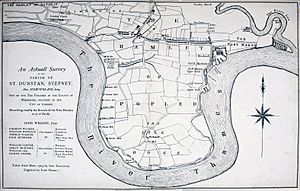William Johnson (MP for Aldeburgh) facts for kids
William Johnson (born around 1660, died 1718) was an important English merchant and shipbuilder. He was also a politician who served in the English and British Parliaments for 29 years, from 1689 to 1718. He lived in Blackwall, Middlesex, and also owned a place called Mandeville's Manor in Sternfield, Suffolk.
Contents
Early Life and Family
William Johnson was the second son of Sir Henry Johnson and Dorothy Lord. He studied in Leyden in 1678. After his studies, he worked for the East India Company in Bengal. This company was a big trading group that brought goods from Asia to England.
After 1683, William came back to England. He started his own business as a merchant, trading with Africa and other parts of Europe. He bought a large estate called Mandeville's Manor near Aldeburgh. However, he mostly lived near the shipyard in Blackwall. This shipyard was inherited by his brother, Henry. In 1687, William married Agneta Baron.
Starting a Political Career
From 1687 to 1689, William Johnson was an Assistant for the Royal African Company. This company was involved in trade with Africa.
In 1689, William was elected as a Member of Parliament (MP) for Aldeburgh. He was a member of the Tory party. His brother Henry helped him get elected in Aldeburgh. In the same year, he also took on other important roles. He helped assess taxes for Middlesex, Suffolk, and Aldeburgh. He was also a Deputy Lieutenant for Tower Hamlets.
William was not very active in his first Parliament. However, he did join six committees. These committees discussed important topics like trade with the East India Company and restoring local governments.
Working in Parliament and Business
William Johnson was re-elected for Aldeburgh in 1690. He was asked to help create a new law to control trade with the East India Company. From 1690 to 1702, he was a Gentleman of the privy chamber, which was a role serving the King. He also became a committee member for the East India Company from 1690 to 1691.
William and his brother, Sir Henry, tried to challenge the East India Company's trading power. They wanted to break the company's monopoly, meaning they wanted other companies to be able to trade too. But their efforts from 1691 to 1694 were not successful.
William was re-elected without opposition in 1695. He continued to work on bills related to the East India Company. He also voted on important money matters, like the price of guineas (a type of coin). In 1696, he voted against punishing Sir John Fenwick, a politician accused of treason. William and his brother later rejoined the East India Company's committee from 1698 to 1699.
In 1698, William and his brother were both re-elected for Aldeburgh without any opposition. William also tried to get elected in another area called Orford, but he lost there. He complained about the election results, and after a long time, the decision was made in his favor.
From 1701 onwards, William only ran for election in Aldeburgh. He was re-elected easily both times that year. As a Tory, he supported the actions of the Parliament in 1702. He was a committee member for the East India Company again from 1702 to 1705.
Managing the Shipyard
William's brother, Henry, had inherited their father's shipyard in Blackwall. Henry used different managers to run the business. By 1704, William Johnson took over the management of the shipyard himself. Between 1704 and 1710, he oversaw the building of many ships. This included five large warships called "ships-of-the-line" and six other vessels. He lived in a house within the shipyard from at least 1705. In 1709, he became an Elder Brother of Trinity House. This was an important group that looked after lighthouses and helped with navigation. He held this position for the rest of his life.
Later Political Years
William Johnson was re-elected without opposition in 1705. He continued to serve as a Tory MP. In 1708, he was re-elected again. In 1710, he voted against the impeachment of Dr. Sacheverell, a religious leader.
After the 1710 election, William was seen as a "Tory patriot." This meant he was against continuing a war that was happening at the time. He also wanted to show how the previous government had mismanaged things. In 1712, he was appointed Commissioner for sewers for Tower Hamlets. This role involved managing the drainage systems in that area.
In 1715, William Johnson was elected for Aldeburgh one last time. He voted against the Septennial Bill, which would have made parliamentary terms longer. In 1716, he took on a new role as governor of Guinea (which is now part of Ghana) for the Royal African Company. He sailed there soon after December 16, 1716.
Death and Family
William Johnson died at Cape Coast Castle in November 1718. He and his wife, Agneta, had three sons and nine daughters. After his death, all his property was sold. The money was then divided equally among his children who were still alive, except for one daughter who was already married.
 | Percy Lavon Julian |
 | Katherine Johnson |
 | George Washington Carver |
 | Annie Easley |


